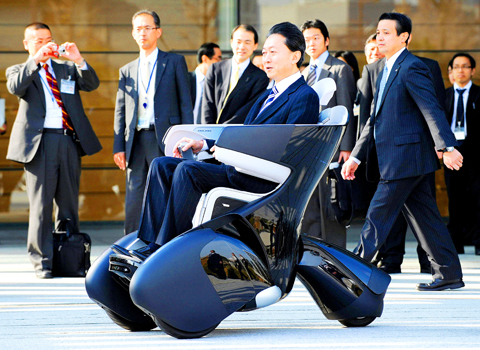Japan unveiled an ambitious goal yesterday to create more than 4 million jobs by 2020 and achieve robust economic growth with steps to boost the tourism, environment and health sectors.
Japanese Prime Minister Yukio Hatoyama, battling sinking poll ratings and a political fund scandal, unveiled a target of annual economic growth of more than 2 percent, adjusted for price changes, over the next decade.
The government has forecast a 2.6 percent contraction in real GDP in the current fiscal year to March next year.

PHOTO: AFP
His three-month-old government aims to create new demand worth more than ¥100 trillion (US$1.1 trillion), seeking to resuscitate the world’s second largest economy after its worst recession in decades.
It was vague about exactly how it would achieve the lofty goals, saying it would come up with more concrete measures by around June.
It hopes 1.4 million jobs will be created in the environment and energy sectors by encouraging development of new technology, such as fuel-efficient cars, along with an additional 2.8 million jobs in the healthcare sector.
Hatoyama’s government, which took power in September, also plans to develop a new indicator that would gauge how happy people are, reflecting worries that traditional measures such as gross domestic product are becoming obsolete.
Surveys have shown that despite Japan’s status as the world’s second-largest economy, many people are unhappy with their standards of living.
Japan’s jobless rate hit a record 5.7 percent in July. Although it has since retreated somewhat, last month it worsened for the first time in four months, rising to 5.2 percent.
Policymakers are increasingly worried that renewed deflation might threaten the country’s economic recovery prospects.
Hatoyama’s center-left Democratic Party of Japan swept to power in August elections, ousting the long-ruling conservatives.
He has pledged to focus on improving people’s incomes through measures such as increased childcare allowances, rather than aiding big business.
The political blue-blood last week marked a troubled first 100 days in office that has seen his public approval rating sink below 50 percent, compared with more than 70 percent in his first weeks in office.
Last week he apologized after one of his former aides was indicted for allegedly misreporting millions of dollars of political donations.

MORE VISITORS: The Tourism Administration said that it is seeing positive prospects in its efforts to expand the tourism market in North America and Europe Taiwan has been ranked as the cheapest place in the world to travel to this year, based on a list recommended by NerdWallet. The San Francisco-based personal finance company said that Taiwan topped the list of 16 nations it chose for budget travelers because US tourists do not need visas and travelers can easily have a good meal for less than US$10. A bus ride in Taipei costs just under US$0.50, while subway rides start at US$0.60, the firm said, adding that public transportation in Taiwan is easy to navigate. The firm also called Taiwan a “food lover’s paradise,” citing inexpensive breakfast stalls

TRADE: A mandatory declaration of origin for manufactured goods bound for the US is to take effect on May 7 to block China from exploiting Taiwan’s trade channels All products manufactured in Taiwan and exported to the US must include a signed declaration of origin starting on May 7, the Bureau of Foreign Trade announced yesterday. US President Donald Trump on April 2 imposed a 32 percent tariff on imports from Taiwan, but one week later announced a 90-day pause on its implementation. However, a universal 10 percent tariff was immediately applied to most imports from around the world. On April 12, the Trump administration further exempted computers, smartphones and semiconductors from the new tariffs. In response, President William Lai’s (賴清德) administration has introduced a series of countermeasures to support affected

CROSS-STRAIT: The vast majority of Taiwanese support maintaining the ‘status quo,’ while concern is rising about Beijing’s influence operations More than eight out of 10 Taiwanese reject Beijing’s “one country, two systems” framework for cross-strait relations, according to a survey released by the Mainland Affairs Council (MAC) on Thursday. The MAC’s latest quarterly survey found that 84.4 percent of respondents opposed Beijing’s “one country, two systems” formula for handling cross-strait relations — a figure consistent with past polling. Over the past three years, opposition to the framework has remained high, ranging from a low of 83.6 percent in April 2023 to a peak of 89.6 percent in April last year. In the most recent poll, 82.5 percent also rejected China’s

PLUGGING HOLES: The amendments would bring the legislation in line with systems found in other countries such as Japan and the US, Legislator Chen Kuan-ting said Democratic Progressive Party (DPP) Legislator Chen Kuan-ting (陳冠廷) has proposed amending national security legislation amid a spate of espionage cases. Potential gaps in security vetting procedures for personnel with access to sensitive information prompted him to propose the amendments, which would introduce changes to Article 14 of the Classified National Security Information Protection Act (國家機密保護法), Chen said yesterday. The proposal, which aims to enhance interagency vetting procedures and reduce the risk of classified information leaks, would establish a comprehensive security clearance system in Taiwan, he said. The amendment would require character and loyalty checks for civil servants and intelligence personnel prior to